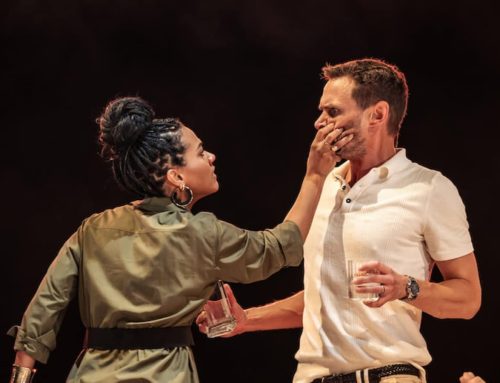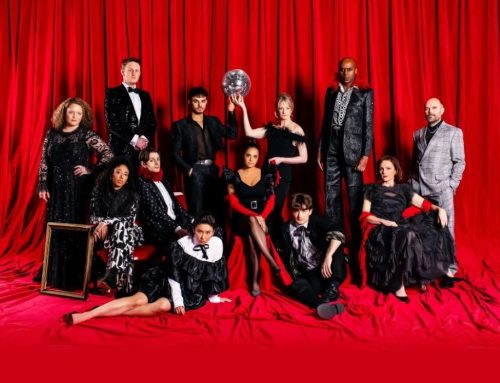Wertenbaker’s 2011 adaptation of Racine’s masterwork Britannicus feels fresh and urgent in Atri Banerjee’s stonkingly good revival at the Lyric Hammersmith.
1 June 2022
Timberlake Wertenbaker is one of my favourite theatre writers and the Lyric’s engrossing new production of her 2011 adaptation of Racine’s Britannicus does full justice to the austerity and economy of the French dramatist’s masterpiece.
The title is something of a misnomer because the play is not really about the eponymous Britannicus, but about how his brooding, stroppy, spoilt, bully of a half-brother, Nero, becomes a monster.
Director Atri Banerjee sets this production, part political-thriller, part family-drama, and part study in incipient evil, among a scheming but elegantly-clad family in modern Rome.
Matriarch Agrippina, performed with ferocious energy by a magnetic Sirine Saba, has installed her son Nero as Emperor in place of the rightful heir Britannicus. She fancies herself as the real power behind the throne. But the ungrateful Nero, impatient with mum’s determination to retain control, has different ideas.
Ghosted by her son and furious at being cut out, Agrippina wants back in with Nero and sees the potential for common cause with the bitter Britannicus.
Meanwhile Nero, played by William Robinson with the vulnerable menace of an over-privileged teenage thug, has his eye on solidifying his power base. Dressed in a white Gucci-style shell suit of impeccable cut, the young ruler also fancies himself in love with his step-brother’s girlfriend Junia.
Pulled in different directions by his desire for love and for power, the demands of an oppressive mother, and the conflicting advice of good and evil advisors, Nero finds himself with a fundamental choice about what kind of emperor he will be. The choices he makes mark the emergence of his true nature.
Rosanna Vize’s set opens with a backdrop a huge painting of Romulus and Remus, suckling on a she-wolf. The picture communicates a powerful message here – that infants who grow up supping on wolf-milk tend to turn into wolves themselves. Nero is, above all, his mother’s son. The choices he takes are framed by the way he grew up, and damn the consequences for others.
At the end of the play the painting has been torn down, its refined and graceful presence replaced by a brutal graffiti-like declaration that the real Nero is now in charge, and things will burn.
I loved Banerjee’s direction.
Shifts between acts are marked by the actors’ uncontrolled shaking. It is highly effective as a way of marking pace, and of creating a dark and threatening tone to the production. There are other clever tricks in his toolkit, too.
The story begins and ends with a violin in hand, although not the same hand. The shadow of a fiddler playing while Roman civilization goes up in flames hangs heavily over the whole performance.
The director never allows his actors to leave the stage. Even when they are not involved, they sit listening to the action, or stand, statue-like, observing the machination and scheming of their peers. The permanent presence of the cast lends a sense of intense claustrophobia to the narrative and is very clever stuff. It is almost as if the stage were a prison to which the characters have been sentenced by fate.
Highly recommended.
Translator & Adaptor Timberlake Wertenbaker
Director Atri Banerjee
Set & Costume Designer Rosanna Vize
Lighting Designer Lee Curran
Cast
Nathaniel Curtis Britannicus
Shyvonne Ahmmad Junia
Nigel Barrett Narcissus
Hanna Khogali Albine
Helena Lymbery Burrhus
Sirine Saba Agrippina
William Robinson Emperor Nero.
Duration: 1 hour, 40 minutes. No interval.
Full Disclosure: I paid full box-office price for the ticket.
More Recent Reviews
Playfight. Soho Theatre.
Writer Julia Grogan’s breathtakingly assured debut play arrives at Soho Theatre following stellar reviews at the Edinburgh Fringe and [...]
All The Happy Things. Soho Theatre.
Naomi Denny’s three-hander comedy-drama All The Happy Things covers familiar themes within a recognisable premise. A grieving protagonist comes [...]
Telly. Bread and Roses Theatre.
The challenge with absurdist comedy is that many people do not find it funny. Laughing at the sheer weirdness [...]



